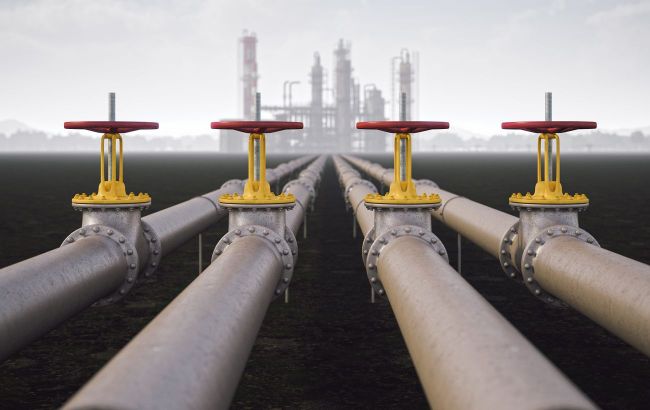Russia faces fuel shortages, Belarus steps in to supply gasoline
 Oil pipeline (photo: Getty Images)
Oil pipeline (photo: Getty Images)
Ukrainian drone strikes on Russian oil refineries have led to fuel shortages in some regions of the country. To compensate for the losses, the Russian authorities have started actively purchasing fuel from Belarus.
Read what are the capacities of Belarus’s oil refining industry, and what benefits does the country gain from exporting fuel to Russia, in the RBC-Ukraine report.
Since August, Ukraine has intensified attacks on Russian oil refineries, aiming to reduce the aggressor’s income from energy exports and to limit fuel supplies for Russian troops. In recent months, Ukrainian drones have attacked at least 15 Russian refineries.
Oil processing volumes at Russian refineries have fallen below 5 million barrels per day, according to Bloomberg estimates. Based on pre-attack production levels, oil refining in Russia has dropped by 9%, or roughly 500,000 barrels per day.
This, in turn, has deepened the fuel shortage within Russia. In response, the Russian government imposed a ban on diesel exports for traders until the end of the current year and extended the full ban on gasoline exports until the end of 2025. In recent weeks, several Russian regions have introduced fuel rationing.
To cover the domestic shortfall, Russia has significantly increased fuel imports from Belarus. In September, gasoline exports from Belarus by rail quadrupled compared to the previous month. Deliveries of gasoline from Belarusian refineries to the Russian market rose to 49,000 tons, equivalent to approximately 14,500 barrels per day, Reuters reported. Diesel deliveries in September amounted to around 33,000 tons.
What is known about Belarusian refineries
During the Soviet era, Belarus developed a large petrochemical complex. The main enterprises in Belarus’s oil refining sector are the Mozyr Refinery and Naftan (Novopolotsk Refinery). Together, these facilities have a capacity to process up to 22 million tons of crude oil per year.
In 2023–2024, oil processing in Belarus amounted to approximately 15 million tons annually, according to Deutsche Welle. Before the war, supplies to Russia were minimal, as they were less profitable compared to exports to EU countries and Ukraine. Since 2022, information on the destinations of Belarusian petroleum exports has been kept confidential, and buyers remain unknown.
Belarus’s energy sector has effectively not been under Belarusian control for a long time, noted Andriy Zakrevskyi, director of the Oil and Gas of Ukraine Association, adding that Russian companies are among the shareholders of Belarusian refineries.
“There is a constant balancing act between the interests of local authorities, state companies, and Russia,” he told RBC-Ukraine, adding that strikes on the Druzhba pipeline have affected the supply of Russian oil to Belarus.
What Belarus gains from supplying fuel to Russia
In the current situation, with fuel shortages in Russia caused by Ukrainian attacks on refineries, Belarus can use this as an opportunity to increase its exports. However, it should not be expected that Belarus will redirect its entire export volume to the Russian market.
Refinery production is allocated according to long-term contracts, so they cannot sharply increase supplies to Russia, explained Serhii Kuyun, Director of the consulting group A-95, to RBC-Ukraine.
“Russians cannot just come and say, ‘We need it, so pump it to us now.’ Everything is long-term, so there may be limits on the volumes,” the expert added.
Belarus does not disclose energy sector statistics, making it practically impossible to assess profits from supplying gasoline to Russia. The benefit for Minsk is more situational and political than real financial gain, sources said.
“For Belarus, the issue of oil supply is not just about profit, but about security. The country uses energy cooperation as a tool of political leverage in relations with China and the US,” Zakrevskyi added.
The fuel crisis in Russia is short-term, and the situation could soon resolve itself even without Belarusian refineries’ help, Kuyun noted. The fuel shortage in Russia arose not only due to refinery strikes but also because of seasonal factors related to harvests, when fuel demand significantly increases.
“They need about a month; for now, they’ll somehow manage the shortage, and then it will fade away, and everyone will forget about that deficit—and no one will remember Belarus,” he added.
On September 29, the Russian authorities in Crimea introduced restrictions on fuel sales - no more than 30 liters per person. A few days later, this limit was reduced to 20 liters.
On October 2, Russia resumed gasoline supplies from Belarus through the St. Petersburg exchange. From July to September this year, 96,900 tons of Belarusian petroleum products were sold in these trades.
In the RBC-Ukraine report, experts explained how the Ukrainian Armed Forces are destroying Russia’s refining capacity and whether a fuel shortage in the Russian army is possible.

